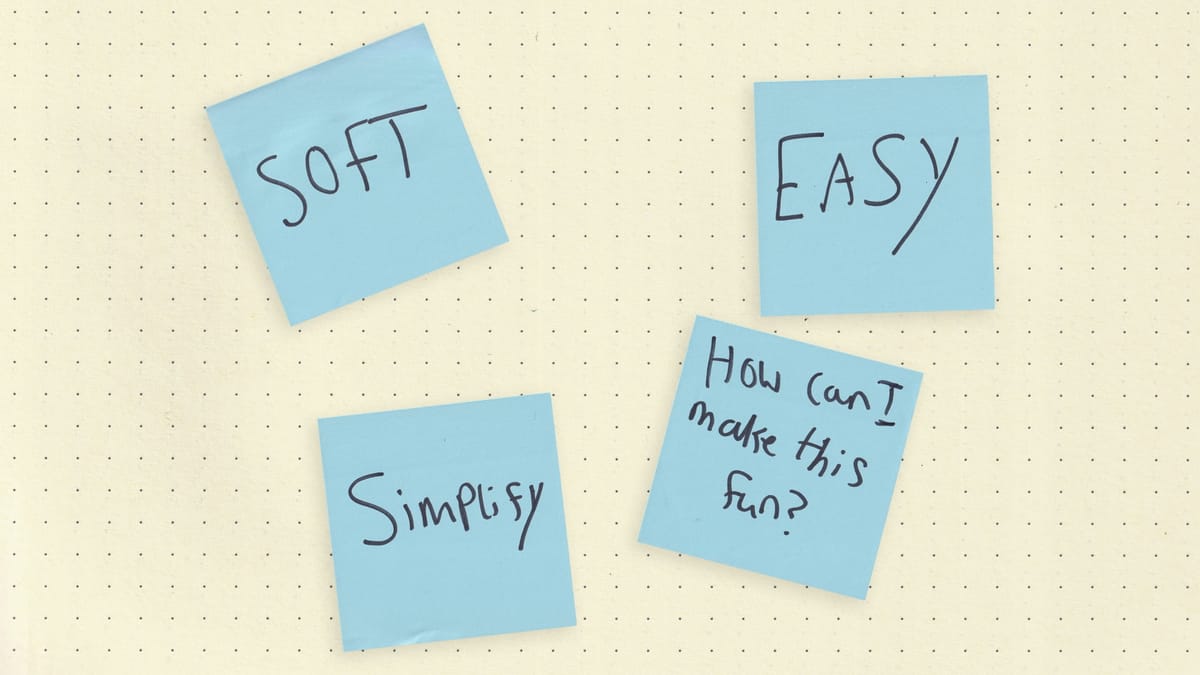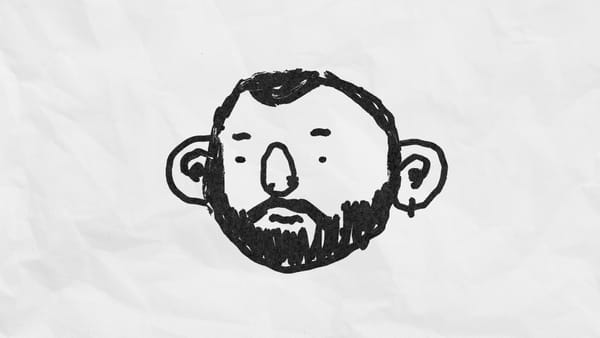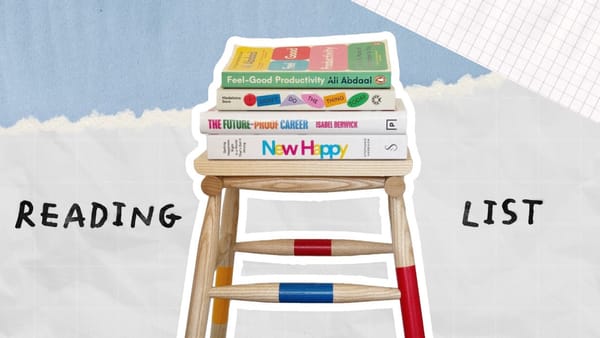10 Soft Reminders I Keep Coming Back to
A running list of the phrases I quietly repeat to myself — in moments of stress, awkwardness, joy, or just the everyday. Some I borrowed. Some I made up. All of them help in big or small ways.

I’ve noticed there are things I keep telling myself — quietly, repeatedly — and they help. So I thought I’d share.
Some of them came from books. Some just… arrived. Most started as full sentences, and over time, I’ve shortened them down to one word or a small phrase I can carry with me.
This post is a living list of those little mantras. Some were borrowed from books or people I admire. Some are things I’ve quietly whispered in the middle of something hard. All of them help in one way or another.
They won’t work for everyone. But they work for me. Each one has its own reason for being here and I’ll keep adding to the list as I go.
1. “Soft”
The Origin: Started as “be soft,” now just “soft.” Something I tell myself when I feel anger. It’s incredible how well it works for me.
Purpose: To remind myself of the kind of person I want to be — not hardened, not reactive. Not because I think anger is wrong, but because I know I don’t want to lead with it. “Soft” is my way of choosing gentleness over hot/fast emotion, grounding over spiralling.
What it helps me combat: Anger, defensiveness, and the temptation to shut down. To be clear, I’m not suppressing emotions — I’m using it literally to soften.
2. “You can sit with the awkward, not me”
The Origin: Comes up when I’m anxious in social situations, especially when I go deep into a niche topic and sense someone glazing over.
Purpose: I really pick up on people’s emotions and therefore edit myself in social situations. This reminds myself that I’m allowed to care about things deeply, and I’m not responsible for someone else’s discomfort. It’s not my job to shrink my joy or mute my interests just because someone else doesn’t share them.
What it helps me combat: Social anxiety, overthinking, and shrinking myself to fit a room. I’m allowed to take up space — even if that space is full of weird facts, enthusiastic tangents, or a vulnerable truth.
3. “How can I make this fun?”
The Origin: A core principal from Ali Abdaal’s book Feel-Good Productivity, though I was already doing it without knowing — turning mundane moments into something a bit more joyful.
Purpose: To shift my mindset when I’m facing a task I’d rather avoid. It turns resistance into ease. I don’t have to wait for motivation — I can change the shape of the task by asking how it could be more enjoyable.
What it helps me combat: Procrastination, dread, and the sense that everything has to be hard. For example, I actually enjoy doing the dishes now — because it’s when I get to listen to my audiobook without distraction. Other examples of this can be as simple as playing fantasy music while you work.
4. “Lean into it”
The Origin: This one is for me, not for someone else. I use it when I feel that familiar surge of anxiety — the fight-or-flight kick — in moments that aren’t dangerous but feel intense.
Purpose: To remind myself that growth often looks like discomfort. That I am safe, even if my body disagrees. That leaning into fear, not running from it, is how I prove I can handle more than I think.
What it helps me combat: Anxious avoidance, the need to escape, and the instinct to pull away from things that matter just because they feel hard.
5. “Lean into them”
The Origin: A great one for all my fellow inward-processors out there in relationships! It started as “Lean into them, they’re here for you.” I say it when I notice myself shutting down emotionally — not because I’m upset, but because I’m inwardly processing. It’s like my shutters go up. But I’ve realised: they can help me out. I don’t always need to do it alone.
Purpose: To remind myself that connection is still an option, even in the middle of a confusing moment. That I can let someone in before I’ve made sense of it all. They’re not there to fix it — just to be there. And that’s enough. If it’s true that they’re my safe person, then they also hold safe spaces for me.
What it helps me combat: Going it alone, retreating inward, and forgetting that help doesn’t always need a reason. Sometimes leaning is the bravest/hardest thing.
6. “Be reasonable, not rational”
The Origin: From The Psychology of Money by Morgan Housel. He explains that while rationality is ideal, it’s rarely realistic — especially when it comes to how we live and spend and make choices. Being reasonable is more human.
Purpose: To lower the pressure on myself when making decisions. Especially when I start overthinking or feel like I’m failing at logic. “Reasonable” gives me permission to factor in feelings, limitations, and context — not just numbers or theory.
What it helps me combat: Perfectionism, decision fatigue, and the idea that there’s always a “right” answer. Sometimes “good enough for now” is more than enough.
7. “What do I have already that is like this?”
The Origin: A question I ask myself when I catch the urge to buy something new — especially something aesthetically pleasing or emotionally comforting.
Purpose:To shift from seeking to appreciating. To pause and consider whether what I have is enough. It gently reframes desire into curiosity, and often reminds me that I already have something close — or better — at home.
What it helps me combat: Impulse purchases, scarcity mindset, and the idea that something new will fix everything. It’s a little practice in sufficiency.
8. “Easy”
The Origin: From the mantra: “I choose to live in Easy World, where everything is easy.” I first came across it via Ali Abdaal, who quoted Julia Rogers Hamrick’s Choosing Easy World. The phrase struck me not as wishful thinking, but as permission — to opt out of struggle when struggle isn’t necessary.
Purpose: To remind myself that ease is often within my control. It’s a cue to soften, to step back without guilt, to not overexert or over-explain. It brings back lightness. When things feel overwhelming or tense, just saying “easy” resets the tone. It’s not about ignoring effort — it’s about letting go of unnecessary weight.
What it helps me combat: Overcomplicating, catastrophising, and unnecessary stress. When I say “easy,” I invite a better way.
“I choose to live in Easy World, where everything is easy.”
9. “Show your work”
The Origin:
From Austin Kleon’s Show Your Work — a book that arrived at exactly the right time. I’ve struggled for years with sharing my creative work, especially on social media like Instagram. I enjoyed documenting life, but when it came to anything I made, I’d get stuck in my head — overthinking, second-guessing, waiting for "perfect." This book helped me shift that. It’s not just advice; it feels like a philosophy — almost a bible for creators. Ali Abdaal mentioned he’s reread it multiple times, and I can see why. It reframed sharing from a scary, self-promotional act into something more human: contributing, connecting, and simply showing up.
Purpose:
To remind myself that sharing isn’t a performance — it’s participation. It encourages me to be open, even when things feel messy or incomplete. This mindset helped me push past the belief that “I could never do this” — especially when building my site. Turns out, I was wrong. Sharing my work creates momentum, confidence, and conversations I’d otherwise miss. I want to keep backing this up by reading more books like it — things that quiet the inner critic and fuel action.
What it helps me combat:
Fear of judgment, perfectionism, and the paralysis of overthinking. It breaks the cycle of waiting until things feel “ready” — and reminds me that progress happens when I stop hiding.
10. “Simplify”
The Origin:
I’m not exactly sure where I first picked this up — it’s been an echo across everything from slow productivity thinkers to minimalists, both of which have massively influenced me. It’s less a single source and more a recurring lesson life keeps teaching me. I’ve realised I often hide behind systems, processes, or complexity. The simpler I make things, the fewer places there are to hide — and that’s where progress actually starts.
Purpose:
To create clarity through intentional simplicity. It’s a reminder that starting with something basic isn’t a weakness — it’s a strategy. When I simplify, I give myself permission to begin without overwhelm. I’ve learned that while “vomiting” ideas onto a page can be therapeutic, it often leaves me stuck trying to untangle the mess. For me, it’s easier — and more effective — to edit up, not down. Whether it’s a project, a plan, or a piece of writing, simplicity helps me move forward with focus. It’s a mindset I can apply anywhere.
What it helps me combat:
Overcomplicating, hiding behind perfectionist tendencies, and stalling because things feel too big or messy. It shifts me from “I need to get everything right” to “What’s the simplest way to start?” — knowing I can build from there.
This list is ongoing — I’ll keep adding as I notice new ones bubbling up.
What about you?
What things do you repeat to yourself — and how they help you?
Speak soon,
Will



